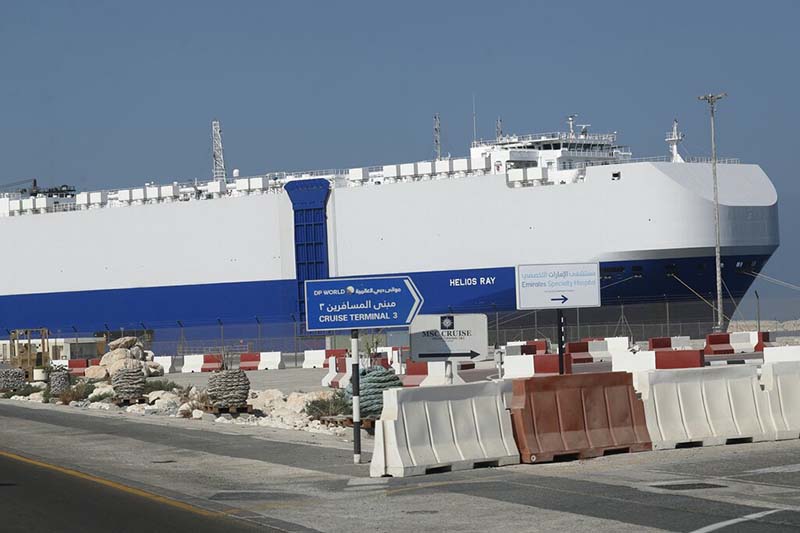

An Israeli-owned cargo ship that suffered a mysterious explosion in the Gulf of Oman came to Dubai’s port for repairs Sunday, days after the blast that revived security concerns in Mideast waterways amid heightened tensions with Iran.
Associated Press journalists saw the hulking Israeli-owned MV Helios Ray sitting at dry dock facilities at Dubai’s Port Rashid. Although the crew was unharmed in the blast, the vessel sustained two holes on its port side and two on its starboard side just above the waterline, according to American defence officials.
It remains unclear what caused the blast, but the incident comes amid sharply rising tension between the US and Iran over its unravelling 2015 nuclear deal. Iran has sought to pressure President Joe Biden’s administration to grant the sanctions relief it received under the accord with world powers that former President Donald Trump abandoned.
From the shore, AP journalists could not immediately see damage to the vessel. The dock blocked the view of the vessel’s starboard side down to the waterline and the port side could only be seen from a distance. The blue and white ship was anchored near Dubai’s storied floating hotel, the Queen Elizabeth 2. An Emirati coast guard vessel was seen sailing behind the ship, with Dubai police and Emirati armed forces vehicles parked nearby.
Emirati officials did not respond to requests for comment on the vessel docking in the country.
Friday’s blast on the ship, a Bahamian-flagged roll-on, roll-off vehicle cargo vessel, recalled a string of attacks on foreign oil tankers in 2019 that the US Navy blamed on Iran. Tehran denied any role in the suspected assaults, which happened near the Strait of Hormuz, a key oil chokepoint.
Israeli officials indicated Sunday that Iran was responsible for the explosion on the ship. In a speech for an army intelligence unit, Israeli military Chief of Staff Aviv Kochavi indirectly referred to the incident, accusing Iran of carrying out “operations against civilian targets.”
“Just this past weekend we received a reminder on one of these fronts from one of the greatest threats in the region, Iran, and we received a reminder that Iran doesn’t just represent a nuclear threat,” he said.
Israeli ambassador to the US and UN, Gilad Erdan, told Israel’s Army Radio that “it was no secret that the Iranians are trying to harm Israeli targets,” alleging the explosion on the ship bore the hallmarks of previous Iranian attacks.
Meanwhile on Sunday, Yemen’s Iran-backed Houthi rebels claimed responsibility for firing a ballistic missile and nine bomb-laden drones at “sensitive sites” in Saudi Arabia’s capital Riyadh the night before. The group’s military spokesman Yahia Sarei added that another six explosive drones targeted “military positions” in the southwestern cities of Abha and Khamis Mushait. The Saudi interception of the missile set off an apparent explosion over Riyadh that startled residents and scattered shell debris, without causing casualties.
The Helios Ray had discharged cars at various ports in the Persian Gulf before making its way out of the Middle East toward Singapore. The blast hit as the ship was sailing from the Saudi port Dammam out of the Gulf of Oman, forcing it to turn to Dubai, in the United Arab Emirates, for inspection.
Iranian authorities have not publicly commented on the ship. The country’s hard-line Kayhan daily, whose editor-in-chief was appointed by Supreme Leader Ayatollah Ali Khamenei, alleged the Helios Ray was “possibly” on an “espionage” mission in the region, without offering any evidence to support the claim. The Sunday report speculated the ship may have been “trapped in an ambush by a branch of resistance axis,” referring to Iranian proxies in the region.
Iran also has blamed Israel for a recent series of attacks, including a mysterious explosion last summer that destroyed an advanced centrifuge assembly plant at its Natanz nuclear facility and the killing of Mohsen Fakhrizadeh, a top Iranian scientist who founded the Islamic Republic’s military nuclear program two decades ago.
Iran’s repeated vows to avenge Fakhrizadeh’s killing have raised alarms in Israel, particularly as the Gulf sees an increase in Israeli traffic following the country’s normalization deals with the UAE and Bahrain.